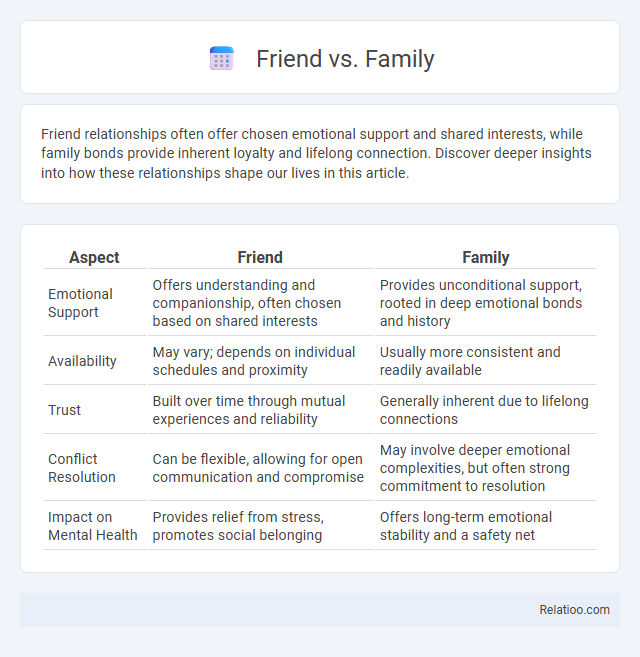Friend relationships often offer chosen emotional support and shared interests, while family bonds provide inherent loyalty and lifelong connection. Discover deeper insights into how these relationships shape our lives in this article.
Table of Comparison
| Aspect | Friend | Family |
|---|---|---|
| Emotional Support | Offers understanding and companionship, often chosen based on shared interests | Provides unconditional support, rooted in deep emotional bonds and history |
| Availability | May vary; depends on individual schedules and proximity | Usually more consistent and readily available |
| Trust | Built over time through mutual experiences and reliability | Generally inherent due to lifelong connections |
| Conflict Resolution | Can be flexible, allowing for open communication and compromise | May involve deeper emotional complexities, but often strong commitment to resolution |
| Impact on Mental Health | Provides relief from stress, promotes social belonging | Offers long-term emotional stability and a safety net |
Defining Friendship and Family Bonds
Friendship is characterized by voluntary emotional connections built on trust, shared interests, and mutual support, often offering chosen companionship beyond biological ties. Family bonds, rooted in genetic or legal relationships, provide inherent responsibilities and enduring support systems that shape identity and social belonging. Availability in both contexts depends on emotional accessibility and commitment, influencing the depth and resilience of relationships.
Emotional Support: Friends vs Family
Emotional support from family often provides a foundation of unconditional love and long-term understanding, while friends offer a unique perspective and companionship that can fill social and emotional gaps. Your availability sometimes influences which source you turn to, as family might be more accessible during crises, but friends often provide immediate empathy and validation. Balancing support between friends and family strengthens your emotional resilience and nurtures diverse connections.
Trust and Loyalty in Both Relationships
Trust forms the foundation of strong bonds in both friendships and family relationships, with loyalty serving as the key element that sustains these connections through challenges. Your ability to rely on consistent support and honesty shapes the quality of these relationships, as friends often offer chosen companionship while family provides unconditional ties. Understanding the availability of each group helps balance expectations, fostering deeper loyalty and mutual trust over time.
Boundaries and Personal Space
Friends and family both play crucial roles in providing emotional support, yet maintaining boundaries and personal space is essential to preserve healthy relationships and prevent burnout. Establishing clear limits regarding time availability and emotional sharing helps balance closeness with independence, ensuring respect for individual needs. Prioritizing open communication about personal space preferences minimizes misunderstandings and fosters mutual respect in both friend and family dynamics.
Conflict Resolution Styles
Friend and family relationships often differ in conflict resolution styles, with family conflicts leaning towards emotional and long-term resolutions due to deeper ties, while friendships may involve more direct and situational approaches. Your ability to navigate availability can significantly affect these dynamics, as time and emotional investment influence the willingness to address or avoid conflicts. Understanding that family might prioritize harmony and friends flexibility can help tailor conflict resolution strategies to maintain healthy relationships.
Influence on Personal Growth
Friends provide diverse perspectives and social support that challenge personal beliefs and encourage self-discovery. Family offers foundational values and emotional stability, creating a secure environment essential for identity development. Availability of supportive relationships, both familial and friendly, directly enhances personal growth by fostering resilience and adaptive skills.
Cultural Perspectives on Friends and Family
Cultural perspectives shape the significance of friends and family in social support, with collectivist societies prioritizing family bonds and interdependence, while individualistic cultures emphasize friendships and personal choice. In many Asian and African communities, family availability and obligation often define social responsibilities more than friendships, influencing resource sharing and caregiving roles. Western cultures generally view friends as voluntary connections that supplement family ties, reflecting values of autonomy and emotional fulfillment.
Quality Time: Friends vs Family Activities
Quality time spent with friends often involves shared hobbies, social events, and mutual interests that foster connection through active engagement and communication. Family activities typically emphasize bonding through routines, traditions, and collaborative tasks that strengthen emotional support and trust. Availability for quality time varies, with friends usually connecting during leisure moments, while family interactions are more frequent but diverse in purpose and setting.
The Role of Communication
Effective communication is crucial in maintaining strong relationships with both friends and family, as it fosters trust, understanding, and emotional support. Availability enhances communication by ensuring timely responses and active listening, which helps prevent misunderstandings and strengthens bonds. Prioritizing open dialogue and presence allows individuals to balance social connections, fulfilling emotional needs in diverse relational contexts.
Navigating Priorities: Balancing Friends and Family
Balancing friends and family requires understanding each group's unique emotional needs and time commitments to maintain strong relationships. Prioritizing availability involves setting clear boundaries and communicating openly to ensure neither friends nor family feel neglected. Effective time management and empathy enable a harmonious balance, fostering deeper connections while respecting individual priorities.

Infographic: Friend vs Family
 relatioo.com
relatioo.com